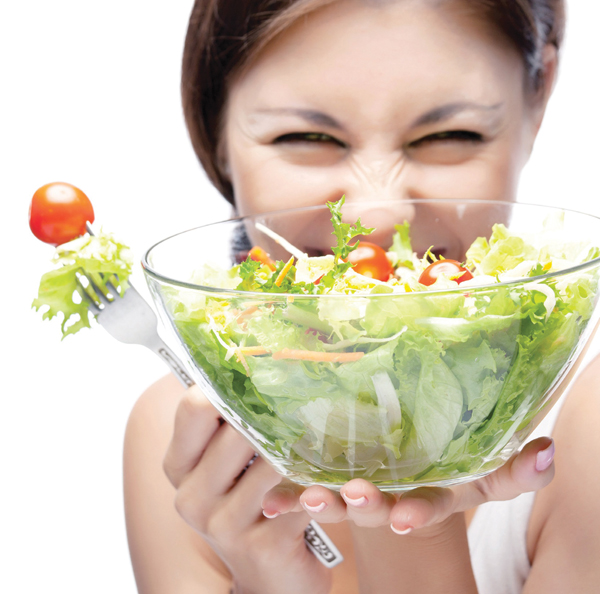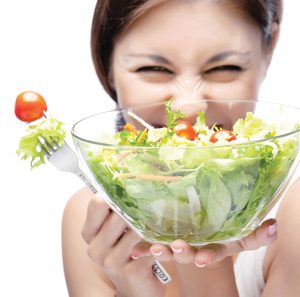
Cancer – a long-standing disease that many people still fear is not really “god”, but more often due to lifestyle, unclean and unsafe food.
It is not difficult to prevent cancer because in addition to the vaccine, you can also prevent it from meals and exercise.

A “smart” diet helps reduce cancer risk according to the following principles:
– Has lots of fresh vegetables, beans and cereals.
– Red meat and salt content is low, saturated fat content of animal origin is low, salt and smoked food content is low.
– Less alcohol, smokers have to quit or both.
– Prevent overweight and obesity, exercise moderately at a young age, avoid excessive and rapid growth.
Palate mesothelioma and esophageal cancer are inversely associated with fruit, possibly with vegetables and positively associated with alcohol and hot drinks; Stomach cancer is inversely associated with vegetable use, positively associated with salt; Pancreatic cancer can be reduced by vegetables and fiber, positively increased with alcohol, meat, protein and glucide; Both uterine and kidney cancer are associated with obesity. Vegetables have a protective effect on all types of cancer.

8 diet and lifestyle tips to prevent cancer:
1. Choose a diet based mostly on plant foods rich in vegetables, beans, potatoes, nuts, low in refined starch foods (foods) and healthy foods.
A plant-based diet contains vitamins, minerals, fiber and other essential components that help the body fight off cancer-causing factors. These foods are often low in fat and calories and should help with weight control.
Do not use processed foods because they are often high in fat, salt, meat and refined sugars, and when processed can destroy many of the nutrients and other ingredients that play a role. Protect the body from cancer.
2. Eat lots of fresh vegetables and ripe fruits
400 to 800 g should be used daily. Scientific evidence shows that a diet high in fruits and vegetables can reduce cancer risk by up to 20%.
The protective effect of fruits and vegetables on cancer through complex interactions between vitamins and minerals, fiber and other chemical components. Leafy greens, cabbage, carrots, tomatoes and lemons are valuable. Fruits and vegetables are not a miracle food, but because they contain many – currently unknown – health benefits. So don’t just eat some things, you should eat a lot of changes. Fruits are superior to refined sugar because they are also rich in vitamins, minerals, and fiber in addition to sweetness.
3. Limit the amount of red meat to no more than 80 g / day, instead use fish, poultry, bird meat. There is ample evidence to suggest that large amounts of red meat are associated with some rectal and breast cancers.
4. Maintain a healthy weight and exercise regularly
Being underweight and being overweight both increase the risk of cancer. Body mass index (BMI) should be in the range of 18.5 to 23. In adults, the weight fluctuates not more than 5 kg. Do not get older as the weight gain, especially after menopause.
Sedentary office workers must maintain an active lifestyle (cycling, gardening, cleaning homes or taking brisk walks for 1 hour / day).
5. Do not drink alcohol, if any, only in moderation (no more than 2 times a day for men and 1 time for women, each time equals 250 ml of beer, 100 ml of alcohol (alcohol) or 25 ml of alcohol While Smoking, some evidence suggests that alcohol is good for heart health but does not include cancer.
6. Choose foods low in fat and low in salt
Choose low-fat foods, especially animal origin (use skim milk, low-fried foods, choose lean meats, skinless chicken, non-fat cakes).
Most processed foods are high in salt and fat, so check the ingredients on the label. Eating a lot of fatty foods not only increases the risk of cancer, but can also lead to being overweight and obesity is another risk factor for cancer.
7. Processing and preserving food safety and hygiene
Some molds and fungi grow in foods that can cause cancer.
Cold storage of fresh food, use within the time allowed. Do not use foods, especially moldy nuts (peanuts, soybeans, beans, …). Meat, fried fish, baked at too high a temperature can create carcinogens on the surface, so discard the burnt part.
8 The above suggestions must be combined with a very important advice: do not smoke and use tobacco in any form. Quitting smoking not only reduces the risk of cancer and other respiratory diseases for yourself but also for others living and working with you.





